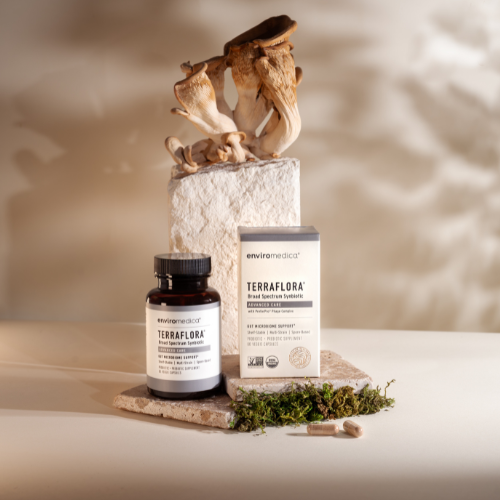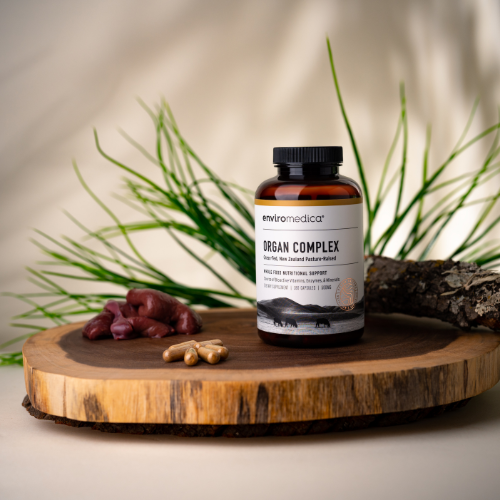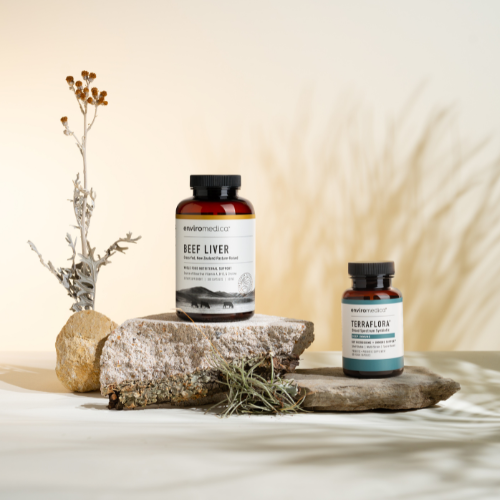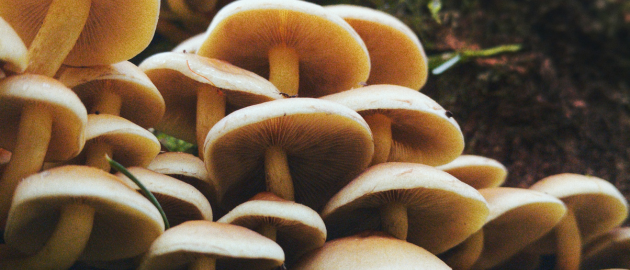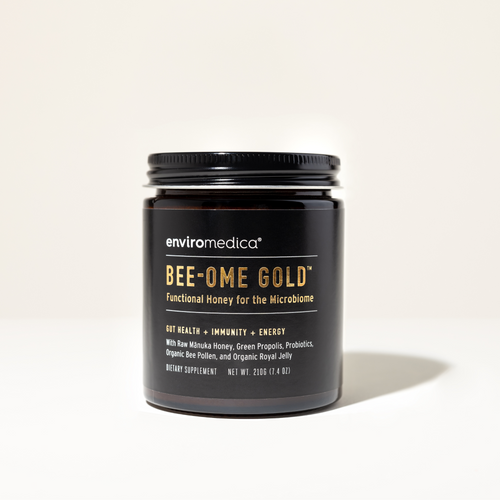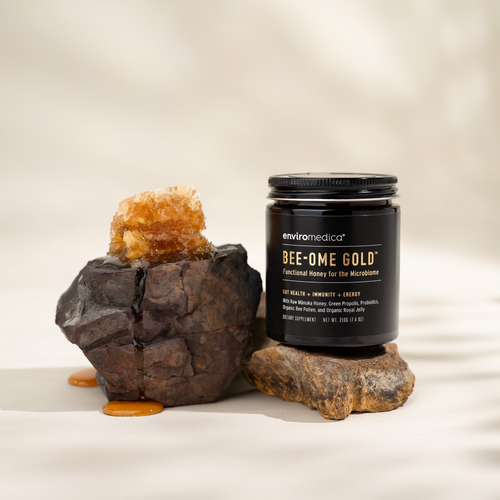The central role of gut health in overall wellness
Gut health is more than just a trend; it's a fundamental aspect of our overall well-being. With emerging research highlighting the gut microbiome's influence on everything from digestion to immunity and even mental health, maintaining a healthy gut is a primary focus for health enthusiasts and scientists alike.1,2
Honey stands out among the various natural substances known to promote gut health. This golden liquid, produced by honeybees, is not just a sweetener; it’s a functional food with powerful properties that can enhance gut health and balance the microbiome.3,4 Honey, especially Mānuka honey, is packed with enzymes, prebiotics, and beneficial compounds that provide numerous health benefits.
Let's explore the magic of honey in supporting gut health, the science behind its benefits, and how Bee-Ome Gold™ combines the power of honey with other hive ingredients to promote overall wellness.5
The importance of gut health
The gut is home to trillions of microorganisms, including bacteria, fungi, viruses, and protozoa. Collectively known as the gut microbiome, these microorganisms play a crucial role in digestion, metabolism, and immune function.
A balanced gut microbiome is essential for:
Digestive Health: Helping to break down food and absorb nutrients effectively.6
Immune Function: Supporting the body's defense against pathogens.7
Mental Health: Producing neurotransmitters like serotonin, which influence mood and behavior.8
Inflammation Control: Regulating the body’s inflammatory response, which is critical for preventing chronic diseases.9,10
An imbalance in gut bacteria can lead to various health issues, including digestive disorders, autoimmune diseases, allergies, and even mental health conditions like anxiety and depression.11,12 Maintaining a healthy gut is fundamental to overall health and wellness.
Honey: Nature's sweet solution for gut health
Honey has been used for thousands of years not just as a food but as a medicinal remedy. Its health benefits can be attributed to its unique composition, which includes:
1. Natural sugars
Honey primarily consists of fructose and glucose, which provide a quick source of energy. Unlike refined sugars, honey has additional health benefits that make it easier for the body to digest.13,14
2. Enzymes
Honey contains enzymes that help in the breakdown of carbohydrates, proteins, and fats, aiding in digestion.15
3. Prebiotics
Honey is a source of prebiotics, which are non-digestible fibers that feed beneficial gut bacteria. This supports a healthy microbiome by promoting the growth of good bacteria while inhibiting the growth of harmful bacteria.16,17
4. Antioxidants
The high levels of antioxidants in honey help reduce oxidative stress, which is essential for maintaining gut health and preventing inflammation.18,19
The benefits of Mānuka honey for gut health
Mānuka honey, derived from the nectar of the Mānuka tree (Leptospermum scoparium) native to New Zealand, is especially noted for its powerful health benefits. The unique compound methylglyoxal (MGO) found in Mānuka honey is responsible for its potent antimicrobial properties.20,21
Here's how Mānuka honey can be specifically beneficial to gut health:
Antimicrobial Activity: Mānuka honey has been shown to inhibit the growth of various pathogens, including Helicobacter pylori, a bacterium linked to stomach ulcers. And its antimicrobial properties help create a balanced gut environment by controlling harmful bacteria.22,23
Biofilm Disruption: MGO is effective at disrupting biofilms, protective layers formed by bacteria that make them resistant to treatment. By breaking down these biofilms, Mānuka honey can enhance the effectiveness of probiotics and other treatments.24,25
Digestive Aid: Mānuka honey can alleviate symptoms of digestive issues such as bloating, gas, and discomfort by soothing the digestive tract, while its anti-inflammatory properties can help reduce inflammation in the gut, promoting better digestion.26,27
Numerous studies support the health benefits of honey for the gut. Research shows honey can enhance the growth of beneficial bacteria, such as Lactobacillus and Bifidobacterium, which are vital for maintaining a healthy gut microbiome.27
A systematic review published in Frontiers in Microbiology found that honey has a significant impact on gut health due to its prebiotic properties, contributing to the modulation of gut microbiota composition.29 Additionally, another study indicated that honey could be beneficial for individuals with gastrointestinal disorders, showing improvements in symptoms and overall gut health.30
The synergy of hive ingredients in Bee-Ome Gold™
At Enviromedica, we believe in harnessing the full potential of honey and other hive ingredients to promote gut health. Our formula combines:
Mānuka Honey (MGO): The star ingredient known for its gut-balancing and antimicrobial properties.
Organic Royal Jelly (10-HDA): Rich in nutrients, royal jelly supports gut health by promoting the growth of beneficial bacteria.
Organic Wild Spanish Bee Pollen: A nutrient powerhouse that acts as a prebiotic, further supporting gut microbiota.
Brazilian Green Propolis (Artepillin C): Known for its antimicrobial and anti-inflammatory properties, propolis enhances gut health and immune function.
By combining these potent ingredients, Bee-Ome Gold™ offers a comprehensive solution for those looking to improve their gut health and overall wellness.
Practical ways to incorporate honey into your diet
In addition to adding Bee-Ome Gold™ to your routine, there are many ways to incorporate honey into your diet:
1. Sweeten your beverages
Use honey to sweeten tea, coffee, or smoothies instead of refined sugar.
2. Add to your breakfast
Drizzle honey over oatmeal, yogurt, or whole-grain toast for a nutritious breakfast.
3. Cooking and baking
Substitute sugar with honey in recipes for a healthier alternative that also adds moisture and flavor.
4. Homemade salad dressings
Create a simple vinaigrette by mixing honey with olive oil, vinegar, and your favorite herbs.
5. On-the-go energy boost
Mix honey with nut butter for a quick and healthy snack that provides energy and sustenance.
Experience the magic of honey for your gut health
Honey, especially Mānuka honey, offers a unique combination of antimicrobial, anti-inflammatory, and prebiotic properties that make it an excellent choice for promoting gut health.
Ready to experience the benefits for yourself? Discover Bee-Ome Gold™ today and embrace the magic of honey for gut health.
References
- 1. Sender R, Fuchs S, Milo R. Revised estimates for the number of human and bacteria cells in the body. PLoS Biol. 2016;14(8):e1002533. https://doi.org/10.1371/journal.pbio.1002533
- 2. Lynch SV, Pedersen O. The human intestinal microbiome in health and disease. N Engl J Med. 2016;375(24):2369-2379. https://doi.org/10.1056/NEJMra1600266
- 3. Alvarez-Suarez JM, Gasparrini M, Forbes-Hernández TY, et al. The composition and biological activity of honey: A focus on Mānuka honey. Foods. 2014;3(3):420-432. https://doi.org/10.3390/foods3030420
- 4. Bogdanov S, Jurendic T, Sieber R, Gallmann P. Honey for nutrition and health: A review. J Am Coll Nutr. 2008;27(6):677-689. https://doi.org/10.1080/07315724.2008.10719745
- 5. Olofsson TC, Vásquez A. Honeybee gut microbiota promotes host weight gain via bacterial metabolism and hormonal signaling. Sci Rep. 2018;8(1):13923. https://doi.org/10.1038/s41598-018-32013-8
- 6. Sonnenburg JL, Bäckhed F. Diet–microbiota interactions as moderators of human metabolism. Nature. 2016;535(7610):56-64. https://doi.org/10.1038/nature18846
- 7. Belkaid Y, Hand TW. Role of the microbiota in immunity and inflammation. Cell. 2014;157(1):121-141. https://doi.org/10.1016/j.cell.2014.03.011
- 8. Foster JA, Rinaman L, Cryan JF. Stress & the gut-brain axis: Regulation by the microbiome. Neurobiol Stress. 2017;7:124-136 https://doi.org/10.1016/j.ynstr.2017.03.001
- 9. Honda K, Littman DR. The microbiota in adaptive immune homeostasis and disease. Nature. 2016;535(7610):75-84. https://doi.org/10.1038/nature18848
- 10. Cani PD, Jordan BF. Gut microbiota-mediated inflammation in obesity: A target for cardiovascular disease prevention? Curr Opin Clin Nutr Metab Care. 2018;21(2):110-117. https://doi.org/10.1097/MCO.0000000000000446
- 11. Cryan JF, Dinan TG. Gut microbiota: Microbiome-gut-brain axis regulates neurodevelopment. Nat Rev Gastroenterol Hepatol. 2019;16(4):193-194. https://doi.org/10.1038/s41575-019-0126-5
- 12. Tilg H, Moschen AR. Microbiota and diabetes: An evolving relationship. Gut. 2014;63(9):1513-1521. https://doi.org/10.1136/gutjnl-2014-306928
- 13. Erejuwa OO, Sulaiman SA, Wahab MS. Honey: A novel antioxidant. Molecules. 2012;17(4):4400-4423. https://doi.org/10.3390/molecules17044400
- 14. Da Silva PM, Gauche C, Gonzaga LV, Costa ACO, Fett R. Honey: Chemical composition, stability, and authenticity. Food Chem. 2016;196:309-323. https://doi.org/10.1016/j.foodchem.2015.09.051
- 15. Bogdanov S. Honey as nutrient and functional food. Bee Product Science. 2014. https://www.bee-hexagon.net/files/file/fileE/Honey/HoneyNutraceutical.pdf
- 16. Shen Q, Tuohy KM, Gibson GR. Prebiotics and the gut microbiota. Curr Opin Gastroenterol. 2011;27(2):99-105. https://doi.org/10.1097/MOG.0b013e328342e561
- 17. Davani-Davari D, Negahdaripour M, Karimian R, et al. Prebiotics: Definition, types, sources, mechanisms, and clinical applications. Foods. 2019;8(3):92. https://doi.org/10.3390/foods8030092
- 18. Alvarez-Suarez JM, Tulipani S, Romandini S, Bertoli E, Battino M. Contribution of honey in nutrition and human health: A review. Mediterr J Nutr Metab. 2010;3(1):15-23. https://doi.org/10.1007/s12349-009-0051-6
- 19. Pasupuleti VR, Sammugam L, Ramesh N, Gan SH. Honey, propolis, and royal jelly: A comprehensive review of their biological actions and health benefits. Oxid Med Cell Longev. 2017;2017:1259510. https://pubmed.ncbi.nlm.nih.gov/28814983/
- 20. Mavric E, Wittmann S, Barth G, Henle T. Identification and quantification of methylglyoxal as the dominant antibacterial constituent of Mānuka honey. Mol Nutr Food Res. 2008;52(4):483-489. https://pubmed.ncbi.nlm.nih.gov/18210383/
- 21. Kato Y, Fujinaka R, Ishisaka A, et al. Plausible pathways of antibacterial activity of Mānuka honey against Helicobacter pylori. Molecules. 2016;21(9):1172. https://pmc.ncbi.nlm.nih.gov/articles/PMC6613335/
- 22. Lusby PE, Coombes AL, Wilkinson JM. Honey: A potent agent for wound healing? J Wound Care. 2002;11(4):175-178. https://pubmed.ncbi.nlm.nih.gov/12439453/
- 23. Irish J, Carter DA, Blair SE, Heard TA. Antibacterial activity of honey derived from Australian flora. PLoS One. 2011;6(3):e18229. https://pmc.ncbi.nlm.nih.gov/articles/PMC3065476/
- 24. Roberts A, Maddocks SE, Cooper RA. Manuka honey reduces the motility of Pseudomonas aeruginosa by suppressing flagella-associated genes. J Antimicrob Chemother. 2015;70(3):716-725. https://pubmed.ncbi.nlm.nih.gov/25404649/
- 25. Lu J, Turnbull L, Burke CM, et al. Mānuka-type honeys inhibit Escherichia coli biofilms and attenuate E. coli virulence. Emerg Microbes Infect. 2014;3(1):e30. https://pmc.ncbi.nlm.nih.gov/articles/PMC3970805/
- 26. Shona N, Bulitta JB, Cohen DP, et al. Potential of manuka honey for the treatment of fungal infections. Front Microbiol. 2020;11:983. https://pmc.ncbi.nlm.nih.gov/articles/PMC11194624/
- 27. Lee J, Hwang K, Kim D, et al. Anti-inflammatory and antioxidant effects of manuka honey in experimental colitis. PLoS One. 2019;14(4):e0214766. https://www.researchgate.net/publication/246547029_Manuka_honey_an_emerging_natural_food_with_medicinal_use
- 28. Majtan J. Mānuka honey: An emerging natural food with medicinal use. Nat Prod Commun. 2011;6(10):1495-1500. https://pmc.ncbi.nlm.nih.gov/articles/PMC4131577/
- 29. O’Neill CA, Monteleone G, McLaughlin JT, Paus R. The gut-skin axis in health and disease: A paradigm with therapeutic implications. Bioessays. 2016;38(11):1167-1176. https://pubmed.ncbi.nlm.nih.gov/27554239/
- 30. Al-Waili NS, Salom K, Al-Ghamdi AA. Honey for gastrointestinal tract disorders: A review. Biomed Res Int. 2017;2017:5694861. https://doi.org/10.1100/tsw.2011.78
